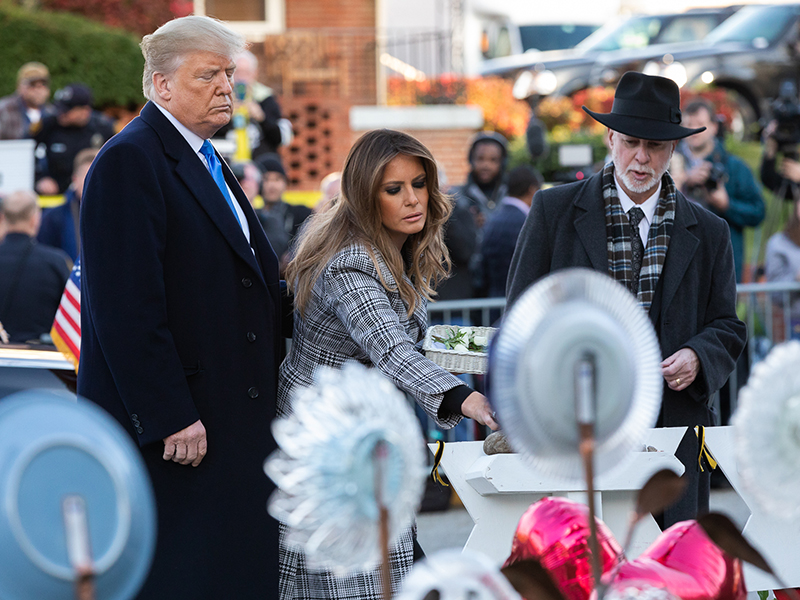British historian Simon Schama called U.S. President Donald Trump “wicked” for appearing to support an unfounded claim that investment magnate George Soros is financing the caravan of migrants heading north from Central America.
Schama charged that the president gave credence to “outrageous” anti-Semitic conspiracy theories about the billionaire, when he told reporters on Oct. 31 that he “wouldn’t be at all surprised” if the claim was true. Soros, who is Jewish, is a huge donor to the Democratic Party and was one of the 14 critics of Trump who was targeted by mailed pipe bombs.
Schama said this was “a wicked thing to say.” The president’s failure to speak out against “the demonizing of Soros as this secretive banker, this manipulator, is a shanda.… He can’t be innocent of the organized attack on Soros as a Jew,” Schama said while answering a question, following his keynote Jewish Book Month lecture at the Jewish Public Library in Montreal on Nov. 1.

“It’s extraordinary to me that these 3,000 Hondurans, mostly women and children, are being represented by Trump as perpetrators of the very things they are fleeing,” said Schama, who said the migration reminds him of the many Jews who have had to run from the countries they lived in.
Schama, a Columbia University professor known for his BBC television documentaries and books, also expressed disgust at Trump’s apparently joking complaint about having “a bad hair day,” after getting wet during a news conference about the deadly Pittsburgh synagogue shooting.
Trump, Schama said, has “no sensibility” with regard to Jews.”

“Anyone who thinks anti-Semitism in not part of U.S. politics today is in denial,” said Schama, who has lived in the United States since the early 1980s and is a contributing editor to the Financial Times.
He gave the example of a campaign flyer sent out late last month by Republican Connecticut state senate candidate Ed Charamut about his Jewish Democratic opponent Matthew Lesser.
The caricature’s “enormous nose, crazed eyes and fistful of money” left no doubt in Schama’s mind that it evoked a hateful image of Jews. (Charamut apologized, following widespread outrage.)
https://twitter.com/aterkel/status/1057325131398287361?ref_src=twsrc%5Etfw
Schama, an outspoken defender of Israel, nevertheless indicated that Jews who support Trump because he moved the embassy to Jerusalem should look at the bigger picture. “The embassy move is not the be all and end all of Jewish life in Israel, or outside,” he said.
Schama’s prepared talk dealt with his latest book, Belonging: The Story of the Jews 1492-1900, the second volume of a planned trilogy covering the entire history of the Jewish people.
Schama, who was knighted this year by Queen Elizabeth, was born in London in 1945. He received wide acclaim for his sweeping five-part BBC series, The Story of the Jews, which aired in 2013.
READ: MORE POLITICAL VIOLENCE POSSIBLE IN U.S.: DAVID FRUM
“Our history is as much about vitality and rebirth, as it is endurance,” said Schama, who does not subscribe fully to what his calls the “lachrymose” school of Jewish history.
“The standard answer to whether a Jew can be fully British, American or Canadian is that we may think we belong, but actually we can never quite be at home,” he said.
However, in the period his latest book covers, Schama describes instances where Jews have lived companionably with other people. This was especially true in places where they “shared the neighbourhood,” rather than being forced to live in designated areas, or wear identifying garb. This harmony was especially true in Holland, he said, where towns were actually forbidden from setting up ghettos.
Our history is as much about vitality and rebirth, as it is endurance.
– Simon Schama
When Jews entered livelihoods outside their traditional occupations, they also found acceptance. Schama highlighted the case of the legendary Daniel Mendoza, who was the professional boxing champion of England in the late 18th century.
There are glaring exceptions, of course, such as that of Alfred Dreyfus, the French army officer who, despite his absolute patriotism, was the victim of blatant injustice in the late 19th century. The affair unleashed blood-curdling expressions of violent anti-Semitic intent within French society, he said, citing passages from the newspaper La Libre Parole.
Disturbingly, similar “monstrous mythology” can be found on the Internet today, Schama said.






